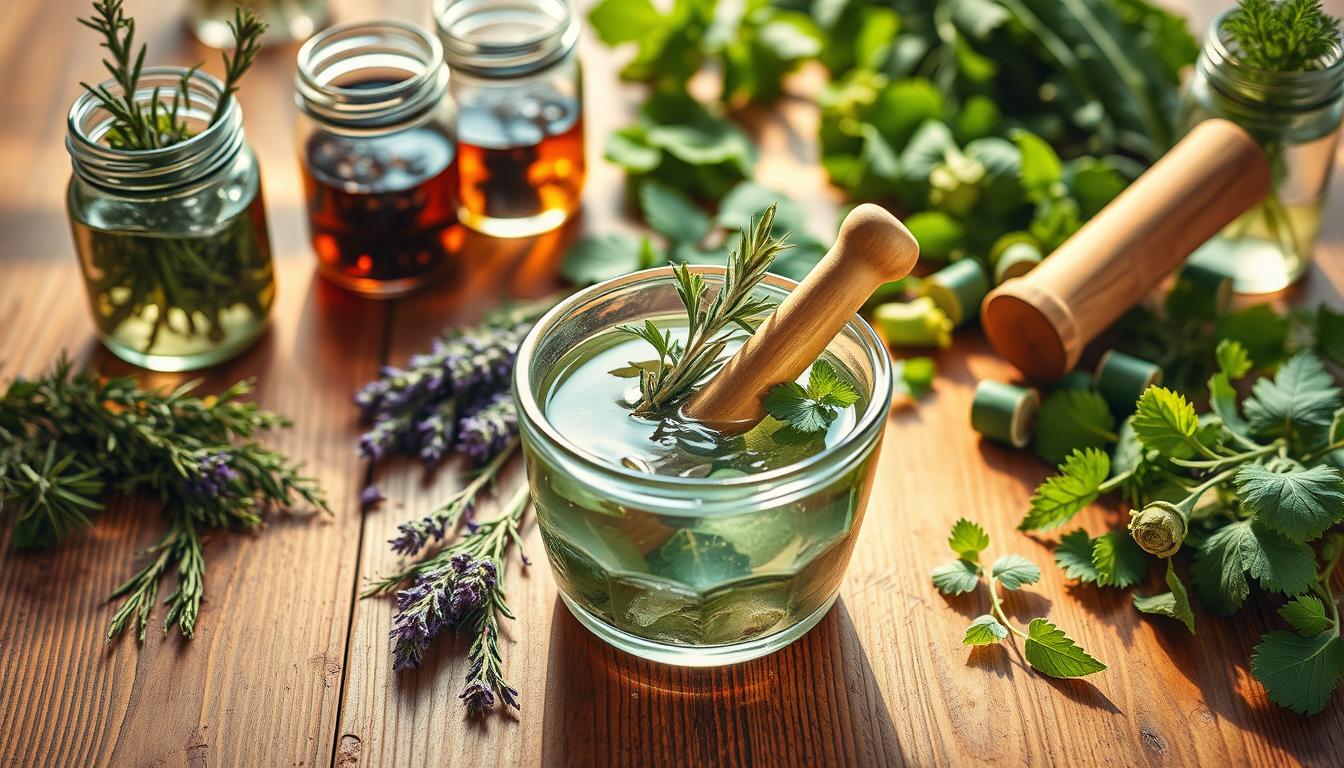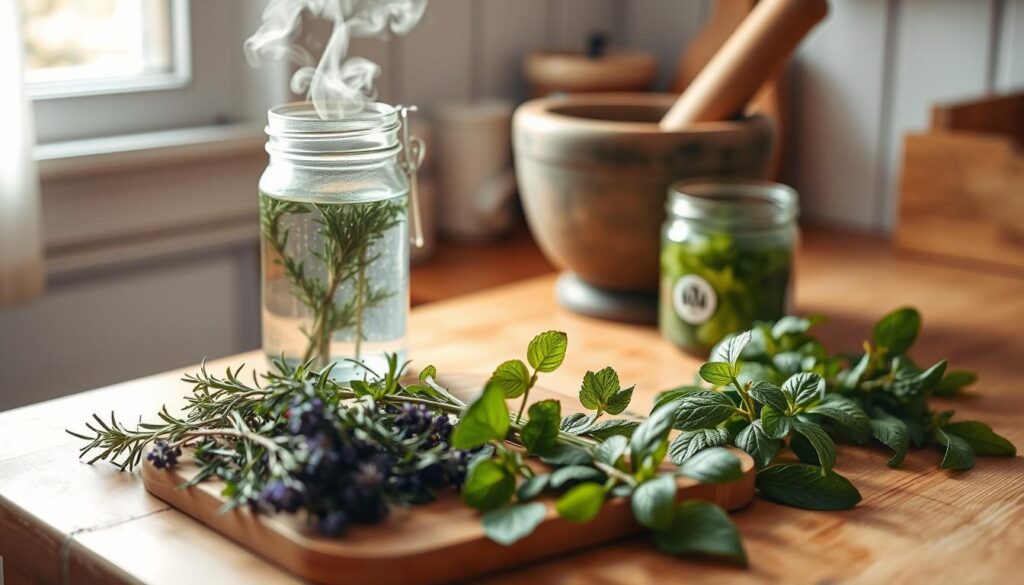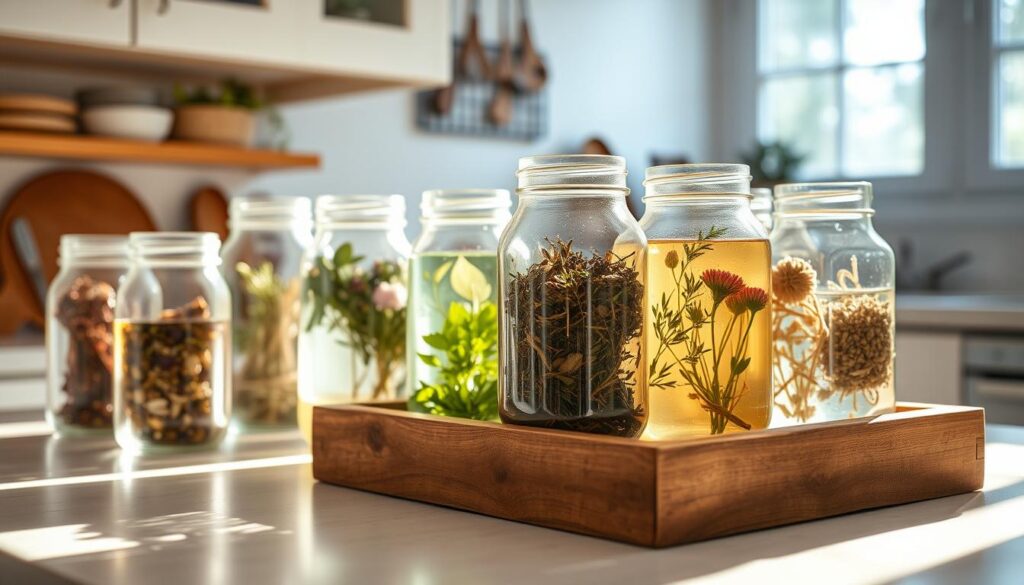How to Make Your Own Herbal Hair Rinse for Stronger Hair

I remember when I found out my hair was dying from commercial shampoos. It was dry, brittle, and lifeless. My hair was crying out for a natural fix.
That’s when I discovered herbal hair rinse. It changed my hair care forever.
The “no ‘poo” movement is more than a trend. It’s a big change for hair health. Traditional shampoos take away your hair’s natural oils. This leads to damage and more damage.
But herbal hair rinse is different. It’s gentle and nourishing. It helps your hair get back to its natural state.
People who use traditional shampoo often have just one good hair day a week. But those who use herbal rinses have healthy hair every day. They have less frizz and a natural shine that no product can give.
By switching to herbal hair rinse, you’re changing your hair care for the better. You’re not just cleaning your hair. You’re starting a new, natural hair care journey.
If you want to get away from harsh chemicals and try a natural hair care, you’re in the right spot. This guide will show you how to make your own herbal hair rinse. You’ll get stronger, healthier hair with simple, natural ingredients.
Understanding the Benefits of Natural Hair Care Solutions
Your hair needs gentle care, not harsh chemicals. Commercial shampoos can harm your scalp and hair. A DIY hair rinse is a natural way to care for your hair from root to tip.
Today’s hair care needs new solutions. Many products remove natural oils, making your hair weak. Herbal remedies for hair are a gentler way to keep your hair healthy and beautiful.
The Problem with Commercial Shampoos
- Contain harmful chemicals like sodium laureth sulfate
- Disrupt natural scalp pH balance
- Cause long-term damage to hair follicles
- Trigger scalp irritation and sensitivity
Why Natural Solutions Are Better
| Natural Ingredient | Hair Health Benefit | Improvement Percentage |
|---|---|---|
| Aloe Vera | Scalp Hydration | 30% Softer Hair |
| Rosemary Oil | Hair Growth Stimulation | 23% Increase |
| Coconut Oil | Hair Strength | 60% Improvement |
The Science Behind Scalp Health
Your scalp is a complex ecosystem that needs care. Herbal remedies for hair work with your body’s natural processes. A DIY hair rinse can help restore balance, reduce inflammation, and promote healthier hair growth.
Understanding scalp health can change your hair care routine. Natural solutions offer a holistic approach. They address the root causes of hair problems, not just the surface.
The Science Behind Herbal Hair Rinse
Herbal hair rinse is more than just a way to clean your hair. It’s about taking care of your scalp and hair in a natural way. Your hair is slightly acidic, with a pH level between 3.67 and 5.5. Herbal rinses help balance this and nourish your hair.
Herbal rinses work in several ways:
- Balancing scalp pH levels
- Removing product buildup
- Nourishing hair follicles
- Promoting natural hair strength
Natural ingredients interact dynamically with your hair and scalp. They provide nutrients that many commercial products take away. Certain herbs help repair your hair’s natural barrier, reducing damage and improving health.
Each herb has its own benefits:
- Nettle: Rich in minerals that strengthen hair roots
- Rosemary: Stimulates circulation in the scalp
- Chamomile: Provides gentle cleansing and shine
Choosing organic hair care, like herbal rinses, is a smart choice. It’s backed by science and works with your body’s natural processes.
Essential Ingredients for an Effective Herbal Hair Rinse
To make a great homemade hair rinse, you need to know the right ingredients. These natural components can make your hair healthier and stronger. They nourish and protect your hair.
Powerful Herbs for Hair Wellness
Herbs have special benefits for your hair and scalp. Here are the top ones:
- Rosemary: Stimulates hair growth and improves circulation
- Nettle: Reduces inflammation and protects against free radicals
- Chamomile: Removes scalp buildup and adds natural shine
- Red Clover: Supports overall hair health
- Yarrow: Helps strengthen hair follicles
Base Ingredients That Make a Difference
Apple cider vinegar is a great base for your rinse. It balances your scalp’s pH and removes buildup.
| Ingredient | Hair Type Benefits | Recommended Quantity |
|---|---|---|
| Apple Cider Vinegar | Balances oily and dry hair | 1:1 ratio with herbs |
| Jojoba Oil | Moisturizes dry hair | 2 oz |
| Castor Oil | Promotes hair growth | 2 oz |
Optional Enhancers for Custom Care
Enhance your rinse with essential oils for specific needs:
- Peppermint: 5-10 drops for scalp stimulation
- Lavender: 5-10 drops for hair relaxation
- Tea Tree: 5-10 drops for dandruff control
Choose your ingredients wisely to make a rinse that meets your hair’s needs. Use fresh, high-quality herbs for the best results.
How to Prepare Your First Herbal Hair Rinse

Making your first homemade hair rinse is an exciting step into natural hair care. It’s a simple way to care for your scalp and hair without harsh chemicals. This is different from what you find in commercial products.
To start making your homemade hair rinse, you’ll need a few ingredients and some basic tools. Here’s how to do it in simple steps:
- Choose your herbs carefully based on your hair type
- Gather fresh or dried herbs
- Prepare boiling water
- Steep the herbs
- Strain the mixture
- Cool and store properly
Here’s a detailed guide for making your herbal hair rinse:
| Ingredient | Quantity | Purpose |
|---|---|---|
| Dried herbs | 4 handfuls | Hair nourishment |
| Water | 1 liter | Extraction base |
| Apple Cider Vinegar | 1/4 cup | pH balancing |
Here are some tips for making your DIY hair rinse:
- Use fresh or high-quality dried herbs for best results
- Boil water and herbs for approximately 30 minutes
- Strain the mixture thoroughly
- Allow the rinse to cool completely before use
Use it twice a week for the best hair health. Remember, results can vary based on your hair type and condition. Try different things to find what works best for you!
Best Herbs for Different Hair Types
Choosing the right herbal remedies can change your hair care routine. Knowing which herbs suit your hair type is key to getting healthy, shiny hair.
Your hair is special and needs specific herbal care. Each hair type needs a unique approach to stay healthy and look great.
Herbs for Oily Hair
For oily hair, some herbs can balance your scalp. These herbs help control oil and refresh your hair.
- Rosemary: Excellent for controlling oil and stimulating circulation
- Peppermint: Helps reduce excess sebum
- Thyme: Natural astringent that minimizes oil buildup
- Calendula: Balances scalp conditions
Herbs for Dry Hair
Dry hair needs lots of moisture and nourishment. Gentle, hydrating herbs can make your hair soft and shiny again.
- Chamomile: Soothes and moisturizes dry scalp
- Lavender: Provides gentle hydration
- Marshmallow Root: Adds significant moisture
- Nettle: Strengthens and conditions dry strands
Herbs for Normal Hair
For balanced hair, versatile herbal remedies are great. They keep your hair healthy and full of life.
| Herb | Primary Benefit |
|---|---|
| Horsetail | Strengthens hair and promotes shine |
| Rosemary | Stimulates hair growth |
| Calendula | Supports scalp health |
Start your journey to find the perfect herbal remedies for your hair. Try these organic solutions to see what works best for you.
Application Techniques and Best Practices
Learning how to apply your herbal hair treatment can change your hair care routine. It’s all about using the right techniques to get the most out of your rinse.
First, get your hair ready for the treatment. Make sure it’s clean and damp. This helps your hair soak up the nutrients better.
Step-by-Step Application Process
- Begin with clean, towel-dried hair
- Pour the herbal rinse slowly over your scalp
- Massage gently using circular motions
- Distribute evenly from roots to ends
- Allow the rinse to sit for 10-15 minutes
Temperature is important for your treatment. Use lukewarm water to open hair cuticles and absorb nutrients better. Cool water is good for the final rinse to lock in moisture and shine.
Frequency and Best Practices
- Use herbal rinses 2-3 times per week
- Adjust frequency based on your hair type
- Avoid over-application to prevent product buildup
Different hair types need different care. Curly hair needs more moisture, while oily hair should use less. Listen to your hair and adjust your routine as needed.
| Hair Type | Recommended Rinse Frequency | Application Notes |
|---|---|---|
| Dry Hair | 2 times per week | Focus on ends, use more moisturizing herbs |
| Oily Hair | 3 times per week | Concentrate on scalp, use clarifying herbs |
| Normal Hair | 2-3 times per week | Balanced application from roots to ends |
Remember, patience is key in your herbal hair treatment journey. Consistent application and careful technique will help you achieve the best results in your natural hair care routine.
The Transition Period: What to Expect
Switching to natural hair care can change your hair and scalp for the better. When you start using herbal hair rinse, knowing what to expect is important.
When you stop using commercial hair products, your scalp will go through big changes. The first few weeks might be tough, but being patient is key to seeing the benefits of natural hair care.
Common Challenges
During the transition, you might face a few common issues:
- Temporary increase in scalp oil production
- Changes in hair texture and appearance
- Potential mild scalp sensitivity
- Adjustment period for hair and scalp
Timeline for Results
The time it takes to adjust varies, but here’s what most people experience:
| Weeks | Expected Changes |
|---|---|
| 1-2 weeks | Increased oil production, potential scalp adjustment |
| 3-4 weeks | Gradual balancing of natural oil production |
| 5-8 weeks | Improved hair texture and scalp health |
About 80% of people see big improvements in their hair health with herbal hair rinse. The secret is to stay patient and consistent during the transition.
Strategies for Success
- Start with gentle, frequent scalp massages
- Use clarifying rinses to manage buildup
- Stay hydrated and maintain a balanced diet
- Monitor your scalp’s response and adjust as needed
Remember, everyone’s hair is different. Your journey to natural hair care will be unique. It’s about finding what works best for your hair type and scalp.
Storage and Shelf Life of Herbal Hair Rinses
Making your own hair rinse means you must pay attention to how you store it. If you store it right, your homemade rinse will stay effective. Herbal hair rinses usually don’t last long and need to be handled carefully to avoid bacteria.

- Refrigerate it right after you make it
- Use clean, sterilized glass containers
- Keep it away from direct sunlight
- Make sure it doesn’t get contaminated
Here are some guidelines for storing different herbal hair rinses:
| Herbal Rinse Type | Refrigerated Shelf Life | Freezing Option |
|---|---|---|
| Rosemary Water | Up to 7 days | Can be frozen in ice cube trays |
| Lavender Rinse | 5-6 days | Freeze for extended use |
| Peppermint Rinse | 4-5 days | Best used fresh |
Watch out for signs that your rinse has gone bad. Look for color changes, strange smells, or mold. If it looks or smells off, throw it away and make a new batch. Making small amounts each week ensures you always have a fresh rinse.
Pro tip: Write the date and ingredients on your rinse. This way, you can keep track of how long it’s been there. For the best results, make small batches and keep them in the fridge.
Combining Herbal Hair Rinse with Other Natural Hair Care Methods
Improving your natural hair care routine is more than just one step. Mixing herbal hair rinses with other natural methods can greatly improve your hair’s health. This makes your organic hair care journey more complete.
Understanding how different treatments work together is key. Each one offers unique benefits that can make your hair healthier.
Apple Cider Vinegar Treatments
Apple cider vinegar is a great clarifying rinse. Mix 1 part ACV with 2 parts water to balance your scalp’s pH. Choose unfiltered, raw apple cider vinegar for the best results.
- Balances scalp pH
- Adds incredible shine
- Removes product buildup
- Reduces dandruff
Oil Treatments
Oils provide deep conditioning that goes well with herbal rinses. Each oil targets different hair needs, making them essential in organic hair care.
| Oil Type | Hair Benefit | Recommended Usage |
|---|---|---|
| Coconut Oil | Moisture Retention | 1-2 times weekly |
| Argan Oil | Shine & Smoothness | 2-3 times monthly |
| Jojoba Oil | Scalp Health | Once weekly |
When using treatments together, make sure to space them out. This prevents your hair from getting too much product. Listen to your hair and adjust as needed for the best results.
Common Mistakes to Avoid
Making a DIY hair rinse can change your hair care game. But, there are common mistakes that can mess up your results. Knowing these mistakes helps you make the best herbal hair rinse for healthier, shinier hair.
When you make your herbal hair rinse, the temperature and how much of each ingredient you use are key. Many people accidentally harm their hair by using water that’s too hot. This can strip away natural oils and weaken hair strands.
- Water Temperature Mistake: Use lukewarm water between 90-100°F for optimal hair health
- Dilution Error: Always dilute apple cider vinegar properly to prevent scalp irritation
- Ingredient Balance: Measure herbs and liquid components precisely
Your DIY hair rinse’s success depends on how well you prepare and apply it. Stay away from these mistakes to avoid ruining your herbal hair rinse:
| Mistake | Consequence | Solution |
|---|---|---|
| Using dirty hair | Reduced absorption of herbal nutrients | Cleanse hair thoroughly before applying rinse |
| Incorrect herb selection | Ineffective treatment for hair type | Research herbs matching your specific hair needs |
| Improper storage | Reduced potency of herbal ingredients | Store in cool, dark place in sealed container |
By avoiding these common errors, you’ll get the most out of your herbal hair rinse. You’ll have healthier, more radiant hair.
Seasonal Adjustments for Your Herbal Hair Rinse
Your hair care routine must change with the seasons. Weather affects hair health, so you need to adjust your herbal treatments.
Seasons bring different challenges for hair health. Winter’s dry air can dry out your hair. Summer’s heat makes your scalp oilier.
Seasonal Hair Care Strategies
- Winter: Focus on intense moisturizing herbal rinses
- Summer: Prioritize clarifying and lightweight herbal treatments
- Spring: Address potential scalp irritation from seasonal allergens
- Autumn: Manage increased hair shedding rates
Knowing your hair’s seasonal needs is crucial. Choose herbs that match the weather and humidity changes.
| Season | Key Herbal Rinse Properties | Target Hair Concerns |
|---|---|---|
| Winter | Moisturizing herbs (chamomile, marshmallow root) | Combating dryness, reducing static |
| Summer | Clarifying herbs (rosemary, nettle) | Managing oil production, UV protection |
| Spring | Soothing herbs (lavender, calendula) | Scalp sensitivity, allergy management |
| Autumn | Strengthening herbs (horsetail, sage) | Reducing hair fall, promoting growth |
Adjusting your herbal hair treatment for each season keeps your hair healthy all year. Consistency and flexibility are essential for natural hair care.
Conclusion
Your journey into herbal hair rinse and natural hair care is more than a beauty routine. It’s a way to care for your hair’s health in a holistic way. Many people have seen their hair become softer and shinier by switching to natural products.
By making your own herbal hair rinse, you take charge of your hair’s health. You learn about your hair’s natural pH and choose the right herbs and ingredients. It’s important to be patient and consistent, letting your scalp and hair adjust to these gentle treatments.
Every hair type is different, and what works for one might not work for another. Try out different herbal mixes and listen to what your hair needs. The aim is to have hair that’s not just beautiful but also healthy and strong.
As you explore herbal hair rinse techniques, you’ll find many natural ingredients that can change your hair care. This journey is about more than looks. It’s about caring for your hair from root to tip with natural solutions.
